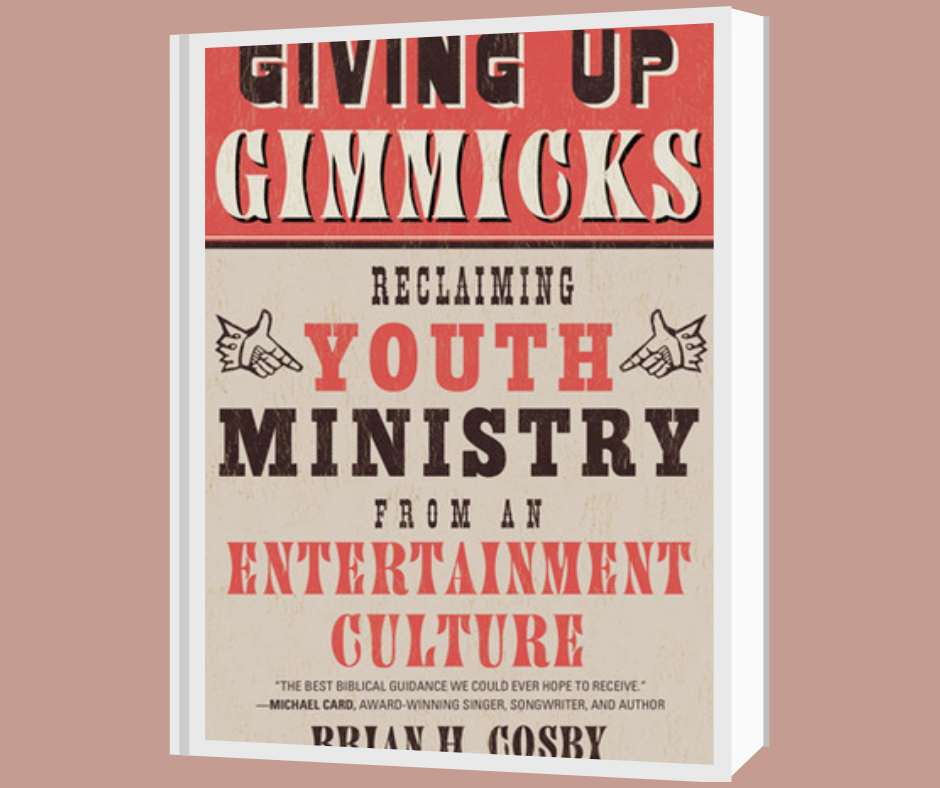Book Reviews
Giving up Gimmicks: Reclaiming Youth Ministry from an Entertainment Culture, by Brian H. Cosby | Review by Rosa Byler

Browsing the church resources section of the local Christian bookstore or the latest CBD catalog, how many of us are likely to pick up a book on youth ministry? The office of youth pastor is not a traditional Anabaptist role. And while most churches do have youth groups and adult sponsors in charge of leading their activities, we may not consider this to be doing “youth ministry,” still less needing to reclaim it from an “entertainment culture.” Christian magicians, fog machines, and strobe lights are not part of our weekly youth gatherings. Does our youth ministry need reclaiming?
The introduction to Giving up Gimmicks (written by Harry Reeder, another obviously concerned pastor) calls our attention to the story of Daniel and his three Hebrew friends. Snatched from home and godly influences and immersed in pagan education, theology and culture, they humbly but courageously maintained their faith in God. Their lifestyle became a statement for God’s glory and a witness of His power and grace--whose influence not only affected their contemporaries, but lasted well into the next generation of Babylonians. Considering that these youths were probably not much older than their early teens, several questions surface. How well would young people of similar age from contemporary (substitute Anabaptist) churches fare under such circumstances? Are we nurturing and establishing our young people in the faith? How well are we preparing them to live consistently for the glory of God in our increasingly pagan culture? The message of this book can be summarized in one statement, also from the introduction: “The gospel of grace produces extraordinary testimonies of grace by the regular and prayerful administration of the ordinary means of grace…” (11-12)
A few clarifications on terminology are in order: Cosby is of Presbyterian and Reformed background and uses several words that may be misunderstood or cause offense. When he refers to the sacraments, he is not attempting to support Roman Catholic error concerning the communion service; this is simply his particular tradition’s label for “baptism and the Lord’s Supper.” Means of grace does not imply a works-based faith; rather, they are the means by which “the Holy Spirit applies the work of Christ, nourishes the Christian’s faith, and draws the believer into deeper communion with Himself.” (25)
Cosby begins with a brief overview of how entertainment has been used as a means of attracting the hearts of young people and why it has not worked (and if you feel smugly that your youth group has been sheltered from this malady and therefore is theologically healthy, keep reading!)
The Reformed churches have traditionally taught three means of grace: the Word, the sacraments, and prayer. To these Cosby adds two more: service/ministry and community. After defining a “means of grace ministry” to young people, the next five chapters explore each “means” in detail.
The means of the Word, of course, is the Word preached, studied and taught. Cosby emphasizes memorization of Scripture and concludes this chapter with eight practical and biblical “applications” (they strongly resemble “results”) of saturating youth ministry with the Gospel. In the chapters on prayer and service, Cosby gives excellent definitions and examples as well as practical instruction on how to lead a prayer-filled youth ministry and develop a service-oriented mindset in our young people. (It is obvious from his stories, illustrating both wholesome and bad examples, that this book was “hammered out ‘on the field’ over the last ten years or so,” as Cosby states in the preface.)
Church traditions have varied widely in their practice of the sacraments; the chapter on baptism and the Lord’s Supper will raise the eyebrows of anyone not brought up on the practices of infant baptism and more than twice-yearly communion services. Cosby states his position on baptism humbly, giving a short rationale for it without dogmatically assuming it to be the only correct way. By far the majority of the chapter is taken up with explaining how to teach the purpose of these two sacraments to our youth in a structured and Scriptural way.
The chapter on community opens by suggesting a parallel between the general breakdown of the family and the development of youth groups in America. While youth ministry seems to be necessary to provide what the family once did, Cosby’s purpose is to help us see it not as a para-church structure, but as a discipleship group with youth-specific teaching—within, connected and accountable to the larger church body. The final chapter gives suggestions for building a youth ministry team, as opposed to the lone youth pastor model. Two appendices give help in evaluating your current youth ministry and shepherding youth alongside their families.
Anyone who is involved with young people –pastors, parents, teachers, youth leaders—will benefit from reading this book! (Our senior pastor gave copies to each couple on our ministry team and to the youth leaders.) Parents of young children will find it helpful in answering questions as well as framing intentional explanations of gospel truths. Reading this book has enriched my own understanding of the process of sanctification, and I am challenged anew with the power and efficacy of the Gospel.